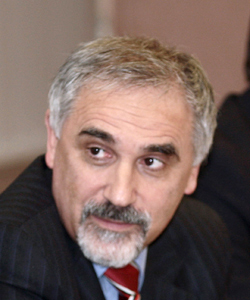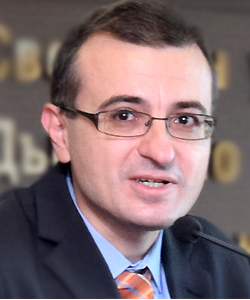The Justice and Development Party in Turkey headed by President Recep Erdogan won convincingly the early Parliamentary elections last week. Turkey’s President Erdogan called these elections “A Vote for the Stability of Turkey”.
 “The Strategy of the Justice and Development Party included consolidation of the nationalistic electorate and possible isolation of the leftist pro-Kurdish Peoples’ Democratic Party”, Director of the Economics and International Relations Institute Lyubomir Kyuchukov told Radio Bulgaria. “If that party failed to cross the 10 percent barrier necessary for entering the Turkish Parliament, the Justice and Development Party would have received a qualified majority in their National Assembly. Turkey’s cabinet intensified its nationalistic actions. On the other hand the bloodshed in Suruc and Ankara boosted the tensions. As a result, the Turkish society became more polarized. Thus, President Erdogan won the early elections and formed a government, but failed to win enough votes that would enable him to change the country’s Constitution towards a President Republic. The key message on these elections was that either the Justice and Development Party would win, or the country would face chaos and Europe would face security problems in relation to the crisis in the Middle East.”
“The Strategy of the Justice and Development Party included consolidation of the nationalistic electorate and possible isolation of the leftist pro-Kurdish Peoples’ Democratic Party”, Director of the Economics and International Relations Institute Lyubomir Kyuchukov told Radio Bulgaria. “If that party failed to cross the 10 percent barrier necessary for entering the Turkish Parliament, the Justice and Development Party would have received a qualified majority in their National Assembly. Turkey’s cabinet intensified its nationalistic actions. On the other hand the bloodshed in Suruc and Ankara boosted the tensions. As a result, the Turkish society became more polarized. Thus, President Erdogan won the early elections and formed a government, but failed to win enough votes that would enable him to change the country’s Constitution towards a President Republic. The key message on these elections was that either the Justice and Development Party would win, or the country would face chaos and Europe would face security problems in relation to the crisis in the Middle East.”
Apparently, Europe prefers to partner with a strong leader who has a majority in his country’s Parliament.
 “The role of President Erdogan as a trustworthy dictator in the current situation is positive for the Turkish President himself, because the international situation favors such behavior”, Associate Professor Plamen Ralchev from the University for National and World Economy said.” This is a short-term role and it is not clear whether in the long-run it would meet certain foreign interests. I believe that Erdogan would start twisting EU’s hands and manipulate it with the fear of huge migration waves that may flood Europe in the future. It is not that likely that Turkey would continue to work towards its EU accession. Bulgaria’s southern neighbor benefits from its relations with the European Union, because it is part of the Customs Union and the economic benefits of its partnership with the union are indisputable.”
“The role of President Erdogan as a trustworthy dictator in the current situation is positive for the Turkish President himself, because the international situation favors such behavior”, Associate Professor Plamen Ralchev from the University for National and World Economy said.” This is a short-term role and it is not clear whether in the long-run it would meet certain foreign interests. I believe that Erdogan would start twisting EU’s hands and manipulate it with the fear of huge migration waves that may flood Europe in the future. It is not that likely that Turkey would continue to work towards its EU accession. Bulgaria’s southern neighbor benefits from its relations with the European Union, because it is part of the Customs Union and the economic benefits of its partnership with the union are indisputable.”
The bilateral relations between Bulgaria and Turkey are of key significance for our security, Lyubomir Kyuchukov said and added:
“If Turkey uses those 2 million migrants to exert pressure over Europe, Bulgaria would be affected negatively first, because we are the EU’s external border. The constant dialogue between Bulgaria and Turkey is extremely significant for our national security and I expect that it would continue in the future.”
Associate Professor Plamen Ralchev expects that the tension in Turkey will escalate and Bulgaria should estimate how given negative processes in its neighbor may affect bilateral relations.
“The processes of restructuring the Turkish society are very significant and would influence the security of that country. Secondly, Bulgaria may be affected by President Erdogan’s ambitions to turn Turkey into a gravity center for all Muslims living on the lands of the former Ottoman Empire. This gravity center is based on religious as well as on social reasons such as unemployment, healthcare, etc. The internal confrontation affects the Bulgarian immigrants with dual citizenship in Turkey. I am working on a book and I had to make anonymous surveys and interviews with Bulgarian migrants living in Turkey. A large group of these people disapprove of Erdogan’s policy and if the outcome of the processes in Turkey is negative, most people with dual citizenship would consider the opportunity to return to Bulgaria. However, nobody is working on that hypothesis”, Plamen Ralchev concludes.
English version: Kostadin Atanasov
Bulgaria’s Parliament failed to hold a session on October 15. "The next session is tomorrow at 9 a.m.", announced National Assembly Speaker Natalia Kiselova. Only 61 MPs registered for attendance during the first and only attempt to open the..
Yet another disaster, yet another series of analyses and post-hoc actions by the relevant institutions. The devastating flood that hit the resort village of Elenite a week ago, claiming four lives, has led the state to realise that the flooded..
“ The result of the changes in the services is the crushing of inconvenient opponents, ever more aggressive political repression, and the ever more brazen plunder of public resources and private business – about which we will be learning less and less,”..
Bulgaria’s Parliament failed to hold a session on October 15. "The next session is tomorrow at 9 a.m.", announced National Assembly Speaker Natalia..
Yet another disaster, yet another series of analyses and post-hoc actions by the relevant institutions. The devastating flood that hit the resort village..

+359 2 9336 661
